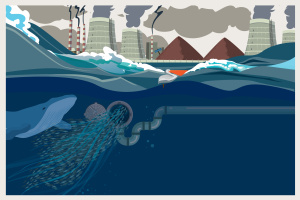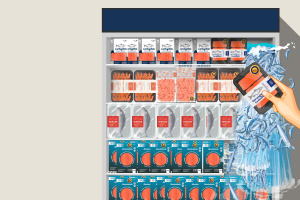Leading retailers complicit in plundering Antarctica for krill
Investigation flags need for immediate action
London 11 August 2022: A new investigative report1 by the Changing Markets Foundation finds that leading retailers are routinely selling dietary supplements and farmed fish using Antarctic krill, a tiny crustacean that is critical for planetary health and helps slow climate change by removing from the atmosphere the equivalent of emissions from 35 million cars each year.2
‘Krill, baby, krill: The corporations profiting from plundering Antarctica’ reveals main companies that benefit from the industry, delves into their sustainability claims, and presents a full picture of their main supply chains for the first time.
“This summer’s heat waves and droughts are a wakeup call that the climate emergency is upon us. Krill are not just amazing animals for their crucial role in the Antarctic food webs, they also help combat climate change. By continuing to sell krill-fed farmed salmon and pricey krill oil supplements leading supermarkets are complicit in depleting the main source of food for whales, seals and penguins, animals that are already under extreme pressure from global heating,” said Sophie Nodzenski, Senior Campaigner at the Changing Markets Foundation.
The report finds that krill oil dietary supplements are sold by 68% of the world’s 50 largest retailers. They were on sale in 88% of the 17 retailers surveyed in North America, 75% of the eight retailers surveyed in Asia and almost half of the 21 surveyed in Europe.
In addition, krill-fed farmed salmon products are routinely sold by 16 leading supermarkets across four European countries: Auchan, Carrefour, Intermarché and Leclerc (France); Carrefour, Dia, Lidl and Mercadona (Spain); Aldi Nord, Edeka, Kaufland and Lidl (Germany); and Asda, Marks & Spencer, Sainsbury’s and Tesco (United Kingdom). All were linked to krill feed (sourced by Norwegian company Aker BioMarine) in their salmon supply chains, and none have adopted policies that exclude the use of krill in the feed used to produce their own branded salmon products.
Scientists have warned that the Antarctic ecosystem is already becoming unstable due to rapidly accelerating global heating. In its latest report, the Intergovernmental Panel on Climate Change (IPCC) questioned the sustainability of krill harvesting and the viability of supply chains and advised producers to use alternatives.3 Krill underpins the health of this vulnerable ecosystem by providing food to a myriad of species. Yet many krill fishing areas overlap with critical feeding grounds, leading scientists to advise that stopping krill fishing in key areas could help offset the damage climate change is exerting on penguin populations.4
The investigation highlights that the krill industry is concentrated in the hands of just a few companies, with a Norwegian company Aker Biomarine taking around two thirds of total catch. The report reveals a range of industry tactics to downplay its damaging impacts, for example by using a range of consumer-based labels to greenwash their product as sustainable. The industry has also been pushing the narrative that the current catch limit is precautionary because it is ‘only 1% of the krill biomass’, but this fails to reflect its impact on the vulnerable Antarctic ecosystem, particularly in the face of accelerating climate change. This illusion of sustainability is further enabled by the Marine Stewardship Council (MSC) which certifies krill-based products as sustainable, despite repeated objections by NGOs and scientists.
Industry players have had to legitimise the existence of krill-based products with research and studies to promote their proclaimed benefits and justify their high price. To date, however, most of these studies – which the industry often commissions itself – have produced mixed results. Yet the industry is not giving up; it is still desperately trying to create new products and markets, such as pet food, to prop up its unprofitable operations.
Due to the repeated failures by the Commission for the Conservation of Antarctic Marine Living Resources (CCAMLR) to properly regulate the krill industry by tightening environmental protections and designating Marine Protected Areas, the Changing Markets Foundation calls for an immediate moratorium on Antarctic krill fishing. It also urges retailers, feed producers and fish farms to phase out the use of wild caught fish for aquaculture, including krill. It advises consumers to stop using krill oil health supplements and to ask their supermarkets to phase out the use of krill in farmed seafood.
“Krill fishing is an inherently destructive and unprofitable industry with a remarkable display of smoke and mirrors to hide the real environmental impact of its operations. On the first ever global Krill Day we urge supermarkets to stop selling krill-based products,” continued Sophie Nodzenski.
The launch of this report coincides with the first ever World Krill Day, a day to celebrate this important species and bring awareness to the key role it plays in the Antarctic ecosystem.
Notes to editors
1. Link to report: https://changingmarkets.org/campaigns/fishing-the-feed/
2. Krill can remove as much as 23 million tonnes of carbon from the Earth’s atmosphere each year by transporting from the surface to the ocean floor. Pew Charitable Trusts, https://www.pewtrusts.org/en/research-and-analysis/articles/2019/10/18/tiny-antarctic-krill-playbig-role-in-climate-mitigation
3. IPCC 2022 WG II
4. Klein et al. (2018), https://journals.plos.org/plosone/article?id=10.1371/journal.pone.0191011#pone0191011-g001
You might also like...

Überfischung: Wildfisch als Fischfutter in Aquakulturen – Schweizer Detailhändler im Vergleich
This report outlines how effectively Swiss retailers are safeguarding the health of the oceans and fish welfare through the sustainability of their aquaculture supply chains. Read our German language report:

What Lies Beneath: Uncovering the truth about Peru’s colossal fishmeal and fish oil industry
This report calls for a rapid phase-out of the use of wild-caught fish to feed farmed fish and other farmed animals.

Futter Bei Die Fische: Ein Bericht zum Umgang von Groß- und Einzelhändlern in Deutschland mit Wildfisch als Fischfutter in ihren Aquakultur-Lieferketten
This report assess how effectively the top seven German supermarkets are addressing the ocean sustainability implications of the farmed seafood they sell. Read our German language report: